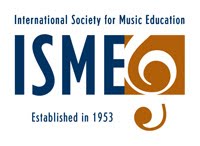The 4th International Symposium on Assessment in Music Education (ISAME4)
Music Assessment and Global Diversity: Practice, Measurement, and Policy.
In April 2013, an international delegation assembled on the beautiful campus of the National Taiwan Normal University, Taipei, Taiwan for a four day symposium to learn more about assessment and reporting of achievement in musical development and learning from an august cast of international and national experts.The first of this series of symposia assembled on the campus of the University of Florida, Gainesville, Florida in 2007.
Figure 1. Administration Building, National Taiwan Normal University, Taiwan.
The 4th International Symposium on Assessment in Music Education (IASME) Music Assessment and Global Diversity: Practice, Measurement, and Policy was co-hosted by Professor Mei-Ling Lai (National Taiwan Normal University); and Professor Timothy Brophy (University of Florida).
Assessment and reporting? Seems like a good idea. Everybody's selling it. But, in the high-stakes world of assessment and reporting policy and practice, we must remind ourselves that the most important aim is to strengthen learning and teaching. But, nobody can truly know what is locked in the world of individuals with the many classifications of complex disabilities and/or impairments, some rare. However, it does seem possible to make such an apparently insular world fulfilling through engagement in The Arts, particularly music. Music seems to provide an outlet for expression and communication with others in an otherwise strange and confusing universe. Indeed, some may possess extraordinary musical gifts and talents despite sometimes complex severe, profound and multiple limitations.
Several delegates took courage to present papers and/or poster demonstrations on the impact of the problematical issue of assessment and reporting policy and practice that confronts the daily work of special educators, paramedical and medical professionals alike. One presentation focussed on standards based assessment and reporting of a music and movement program for individuals with Autism Spectrum Disorders (ASDs).
ISME Music and Special Education, Music Therapy and Music Medicine Commissioners, Jessie Chen and Helen Farrell were delegates to this symposium. Jessie served as a presider for several sessions and Helen presented a paper and poster demonstration titled The Blind Assessor: Are We Constraining or Enriching Diversity of Music Development and Learning? Helen's presentation focused on the contributions of the growing body of specialist knowledge and understandings in the neurobiology, neurology and neuropsychology of the many classifications of complex disabilities and/or impairments; and its interaction with the growing body of specialist knowledge and understandings in music psychology/auditory cognitive neuroscience. This specialist knowledge and understandings shape approaches to this high-stakes debate.
Curriculum, assessment and reporting frameworks simply must take courage to accomplish innovative and sustainable outcomes that, in some modest ways, mitigate political, economic, social and cultural exclusion of children and young people of compulsory school age with the many classifications of complex disabilities and/or impairments.
The take-home message from this symposium is that members of the ISME Commission on Music and Special Education, Music Therapy and Music Medicine also take courage and advocate with determination and feistiness with whosoever we work in this high stakes debate.





No comments:
Post a Comment